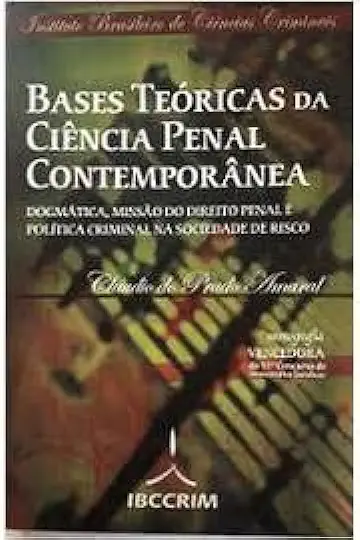
Theoretical Foundations of Contemporary Criminal Science - Cláudio do Prado Amaral
Theoretical Foundations of Contemporary Criminal Science: A Comprehensive Exploration of the Evolution of Criminal Science
Introduction: Unveiling the Complexities of Criminal Behavior
In the ever-evolving field of criminal science, understanding the theoretical foundations that shape our comprehension of criminal behavior is of paramount importance. Cláudio do Prado Amaral's groundbreaking work, "Theoretical Foundations of Contemporary Criminal Science," embarks on an intellectual journey that delves into the intricate tapestry of criminal science, offering a comprehensive analysis of its historical development, key theories, and their practical implications. This book is an indispensable resource for scholars, practitioners, and anyone seeking a deeper understanding of the complexities of criminal behavior and the science behind it.
Historical Evolution: Tracing the Roots of Criminal Science
Amaral begins by tracing the historical evolution of criminal science, providing a detailed account of its origins and the key figures who shaped its development. From the early contributions of Cesare Lombroso and Enrico Ferri to the groundbreaking theories of Edwin Sutherland and Robert K. Merton, the book offers a comprehensive overview of the intellectual currents that have shaped our understanding of crime and criminality.
Theoretical Perspectives: Exploring the Diverse Landscape of Criminal Science
At the heart of the book lies an in-depth exploration of the diverse theoretical perspectives that underpin contemporary criminal science. Amaral meticulously examines a wide range of theories, including biological, psychological, sociological, and environmental approaches, providing a balanced and critical analysis of their strengths and limitations. This comprehensive exploration allows readers to gain a profound understanding of the multifaceted nature of criminal behavior and the various factors that contribute to it.
Practical Applications: Translating Theory into Action
The book goes beyond mere theoretical discourse by demonstrating the practical applications of criminal science in the real world. Amaral discusses how theoretical insights have informed crime prevention strategies, criminal justice policies, and rehabilitation programs, highlighting the tangible impact of criminal science on society. This practical orientation makes the book not only intellectually stimulating but also highly relevant to practitioners and policymakers seeking to address the challenges of crime and criminality.
Interdisciplinary Perspectives: Embracing the Convergence of Disciplines
Recognizing the interdisciplinary nature of criminal science, Amaral emphasizes the importance of integrating insights from various fields, including psychology, sociology, economics, and biology. This holistic approach provides a more comprehensive understanding of criminal behavior and allows for the development of more effective crime prevention and control strategies. The book encourages readers to think beyond traditional disciplinary boundaries and embrace the potential of interdisciplinary collaboration.
Conclusion: A Call for Continuous Exploration
"Theoretical Foundations of Contemporary Criminal Science" concludes by emphasizing the dynamic nature of criminal science and the need for continuous exploration and research. Amaral challenges readers to critically engage with existing theories, question assumptions, and contribute to the ongoing evolution of the field. This call to action underscores the importance of intellectual curiosity and the pursuit of knowledge in advancing our understanding of criminal behavior and developing effective responses to the challenges it poses.
Why You Should Read This Book:
- Gain a comprehensive understanding of the historical evolution and theoretical foundations of criminal science.
- Explore a diverse range of theoretical perspectives, from biological to environmental approaches, and critically assess their strengths and limitations.
- Discover the practical applications of criminal science in crime prevention, criminal justice policies, and rehabilitation programs.
- Embrace the interdisciplinary nature of criminal science and explore the potential of integrating insights from various fields.
- Join the ongoing exploration of criminal behavior and contribute to the advancement of the field.
"Theoretical Foundations of Contemporary Criminal Science" is an essential resource for anyone seeking a deeper understanding of the complexities of criminal behavior and the science behind it. With its comprehensive analysis, practical orientation, and interdisciplinary approach, this book is a must-read for scholars, practitioners, and anyone interested in the fascinating world of criminal science.
Enjoyed the summary? Discover all the details and take your reading to the next level — [click here to view the book on Amazon!]